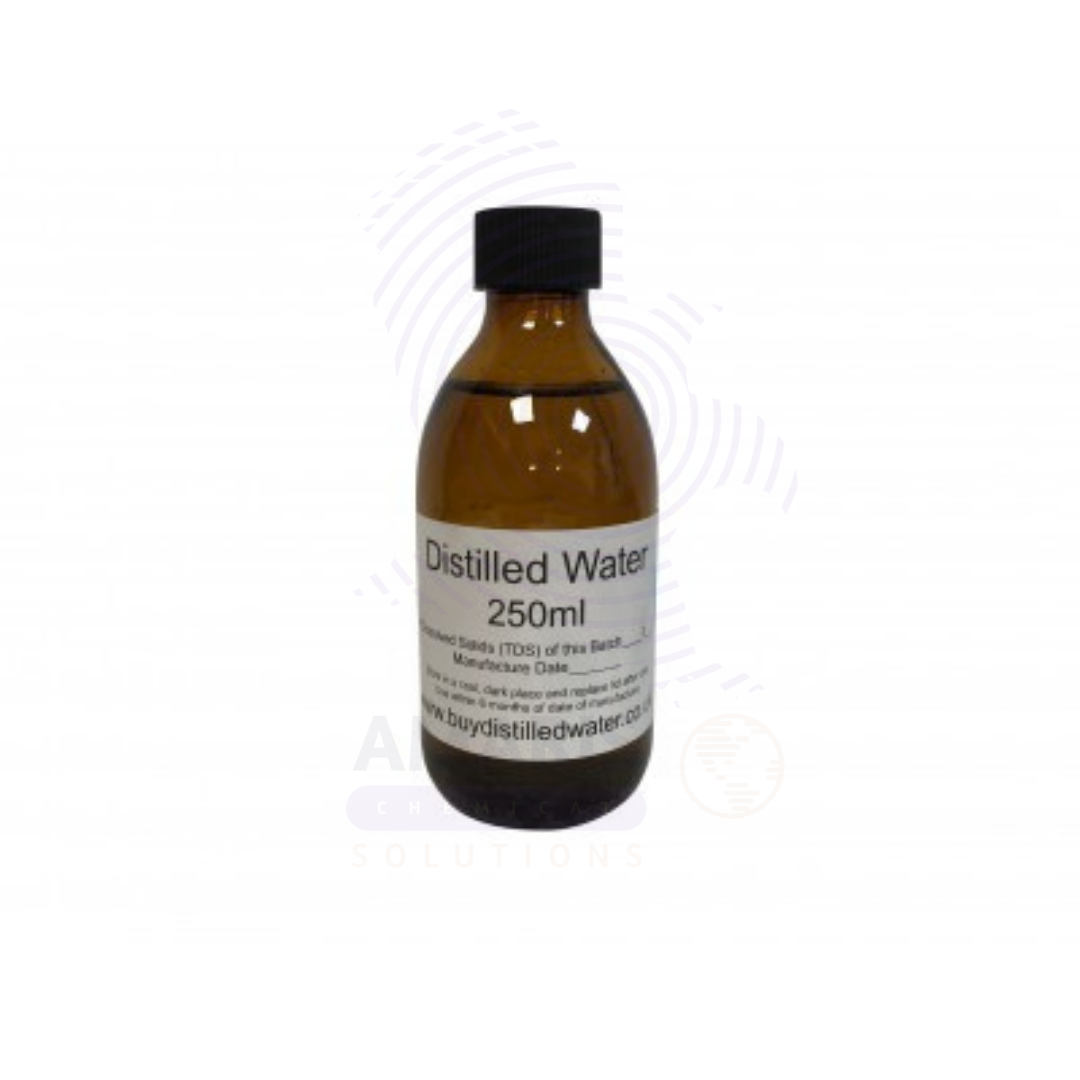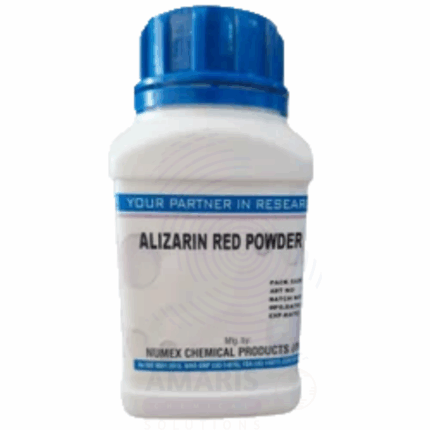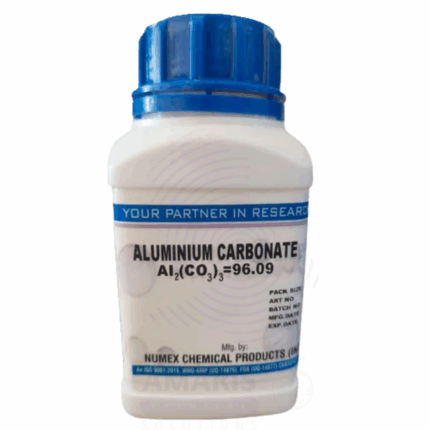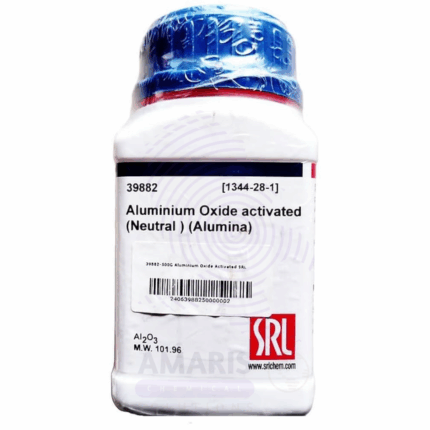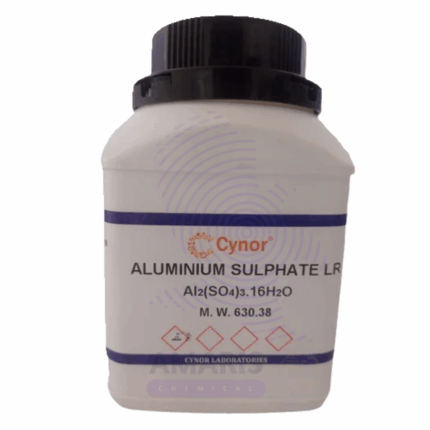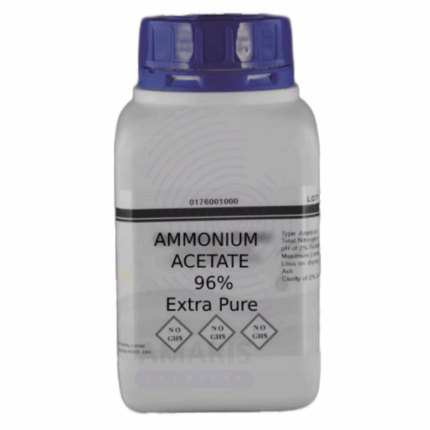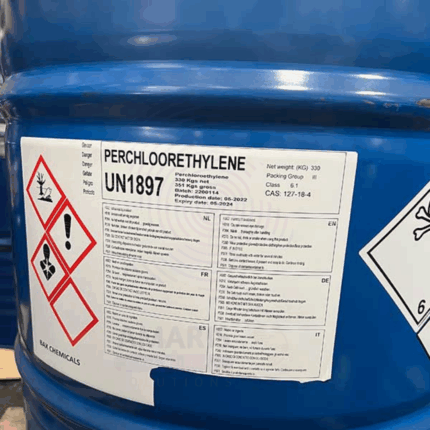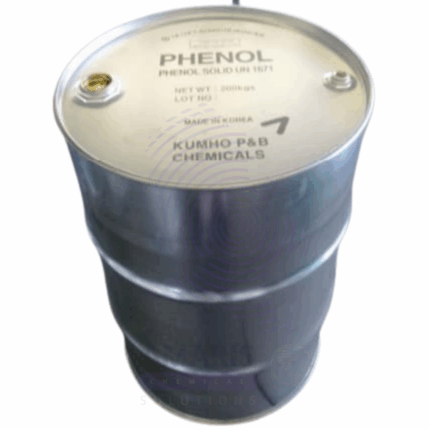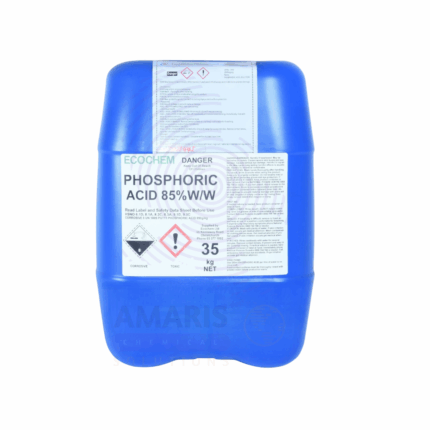“Ammonium Chloride Extra Pure” has been added to your cart. View cart
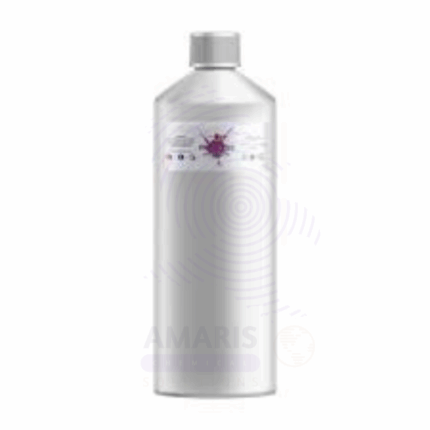
Royal Type Oil Fragrance
$ 29.00 Original price was: $ 29.00.$ 28.64Current price is: $ 28.64.
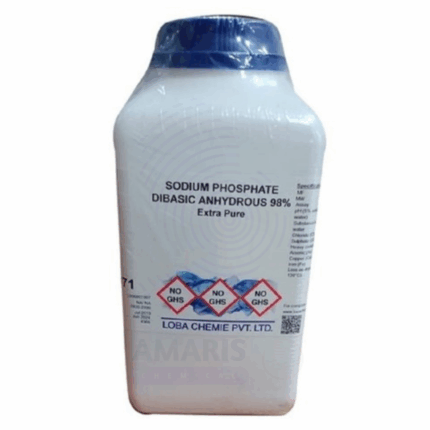
Disodium Phosphate Extra Pure
$ 18.00 Original price was: $ 18.00.$ 17.80Current price is: $ 17.80.
Distilled Water Extra Pure
$ 7.00 Original price was: $ 7.00.$ 6.59Current price is: $ 6.59.
Whatsapp Order
Distilled Water Extra Pure is laboratory-grade water that has been thoroughly purified through distillation to remove all dissolved salts, minerals, organic compounds, and microbial contaminants. It serves as an essential solvent and diluent in chemical analyses, reagent preparation, and biological experiments where purity is critical. Its high level of cleanliness ensures minimal interference in sensitive laboratory procedures, making it ideal for use in analytical instrumentation, standard solution preparation, and microbiological testing.
Description
Table of Contents
Toggle
Distilled Water Extra Pure
Primary Uses
- Solvent for reagent preparation:
Acts as a pure, neutral medium for dissolving chemicals to prepare accurate solutions. - Cleaning and rinsing laboratory glassware and instruments:
Prevents contamination from minerals or ions present in tap water. - Dilution of concentrated acids, bases, and stock solutions:
Ensures precision in concentration and avoids unintended reactions. - Sample preparation and reconstitution:
Used to prepare or rehydrate biological, chemical, and pharmaceutical samples. - Media preparation in microbiology and cell culture:
Provides a sterile and inert water source that supports controlled growth environments.
Secondary Uses
- Calibration of instruments (e.g., pH meters, spectrophotometers):
Used as a reference or blank for accurate measurements. - Water bath filling for controlled heating:
Provides a clean medium for uniform heat transfer without introducing contaminants. - Storage of sensitive chemicals or biological samples:
Ensures minimal interference or degradation over time. - Steam generation for autoclaves or distillation setups:
Produces contaminant-free steam for sterilization and experimental use.
KEY PRODUCT FEATURES
KEY ATTRIBUTES
1. Basic Identification Attributes
- Chemical Name: Distilled Water
- Other Names: Purified Water, H₂O (distilled)
- Chemical Formula: H₂O
- CAS Number: 7732-18-5
- Grade: Extra Pure (Laboratory Grade)
- Molecular Weight: 18.02 g/mol
- Appearance: Clear, colorless, odorless liquid
2. Physical & Chemical Properties
- Solubility: Universal solvent (miscible with most substances)
- pH: ~5.5 – 7.0 (due to dissolved atmospheric CO₂)
- Boiling Point: 100 °C at 1 atm
- Freezing Point: 0 °C
- Conductivity: <1 µS/cm (ultrapure types can be ~0.05 µS/cm)
- Purity: Free from dissolved salts, organic matter, and particulates
3. Safety & Hazard Attributes
- GHS Classification: Not hazardous
- Hazard Statements: None
- PPE Requirements (when applicable):
- Generally none required
- Use gloves and eye protection if used with reactive substances
- First Aid Measures:
- Inhalation / Ingestion / Contact: No adverse effects expected
4. Storage & Handling Attributes
- Storage Conditions:
- Store in clean, tightly sealed containers
- Avoid contamination from air or glassware
- Store at room temperature away from reactive chemicals
- Handling Notes:
- Use only with clean or sterile equipment
- Avoid contact with reactive or hygroscopic substances
5. Regulatory & Compliance Attributes
- EC Number: 231-791-2
- UN Number: Not regulated
- Hazard Class: Not hazardous
- REACH Status: Exempt
6. Laboratory Applications
- Primary Uses:
- Solvent in chemical reactions and dilutions
- Rinsing agent for labware
- Reagent preparation
- Blank or control in analytical procedures
- Other Uses:
- Used in autoclaves and sterilizers
- Medium for microbiology or biochemistry work
- Ingredient in aqueous solutions and buffers
SAFETY HANDLING PRECAUTIONS
SAFETY MEASURES
SAFETY & HANDLING
- PPE: None required under normal lab use, but lab hygiene should be maintained
- Storage:
- Store in clean, inert plastic or glass containers
- Keep tightly sealed to avoid airborne contamination (e.g., dust, CO₂)
- Avoid recontamination—dispense with sterile pipettes or clean vessels
STABILITY & COMPATIBILITY
- Stability: Stable under normal conditions
- Reactivity: Non-reactive, but can dissolve gases, minerals, or contaminants if exposed
- Avoid contact with: Contaminated surfaces, non-lab grade containers, reactive metals (in sensitive analyses)
FIRST AID MEASURES
- Eye/Skin Contact / Inhalation / Ingestion: No known hazard under standard conditions.
- If contamination is suspected, treat as per the contaminant involved.
Related products
Alizarin Extra Pure
Alizarin Extra Pure is a high-grade anthraquinone-based dye, presented as a reddish-brown crystalline powder, renowned for its vivid coloration and strong affinity for metal ions. It is primarily used in analytical chemistry as a complexometric indicator, especially for detecting aluminum, calcium, and other metal ions through color change. Due to its exceptional purity, it is also employed in histological staining, textile research, and pigment synthesis where precision and consistency are critical. Alizarin Extra Pure offers excellent stability and intense coloration, making it ideal for scientific, educational, and specialized industrial applications. Proper storage in a cool, dry environment is essential to maintain its effectiveness and prevent degradation.
Aluminium Carbonate Extra Pure
Aluminium Carbonate Extra Pure is a high-purity, white, odorless powder primarily used as a reagent in laboratory settings for analytical and research applications. Though not commonly stable under standard conditions, it is valued in controlled experimental procedures involving the study of aluminum compounds, buffer systems, and inorganic reactions. Its extra pure grade ensures low levels of contaminants, making it suitable for precise qualitative and quantitative analysis. Due to its sensitivity to moisture and tendency to decompose into aluminum hydroxide and carbon dioxide, it must be handled with care and stored in airtight containers under dry conditions to maintain chemical integrity during laboratory use.
Aluminium Oxide Active Neutral Extra Pure
Aluminium Oxide Active Neutral Extra Pure is a high-purity, fine white powder known for its high surface area and neutral pH, making it ideal for chromatography, adsorption, and catalyst support in laboratory research. Its active form ensures excellent capacity for separating and purifying organic compounds without altering their chemical structure, especially in column chromatography applications. Commonly used in analytical, organic synthesis, and material science laboratories, it provides consistent performance in adsorption studies, drying of solvents, and reaction monitoring. The extra pure grade ensures extremely low levels of impurities, suitable for high-precision experimental work. To maintain its activity, it should be stored in airtight containers away from moisture and reactive chemicals.
Aluminium Sulphate Anhydrous Extra Pure
Aluminium Sulphate Anhydrous Extra Pure is a high-purity, white crystalline or powdery solid commonly used in laboratory chemistry as a source of aluminum ions for precipitation, titration, and coordination studies. Its anhydrous form provides a concentrated and stable option for applications requiring precise control over water content, such as analytical reagent preparation, pH adjustment, and synthesis of other aluminum salts. This compound is also used in paper sizing experiments, dye fixation, and water treatment research. The extra pure grade ensures very low levels of contaminants, supporting accurate and reproducible results in sensitive experimental work. It should be stored in airtight containers in a dry area to prevent moisture absorption and preserve its chemical integrity.
Ammonium Acetate Extra Pure
Ammonium Acetate Extra Pure is a high-purity, white crystalline solid that is highly soluble in water and commonly used as a buffer component in laboratory and analytical chemistry. It is especially valuable in high-performance liquid chromatography (HPLC), mass spectrometry, and biochemical assays where pH control and minimal ionic interference are essential. This compound also serves as a reagent in organic synthesis, particularly in the preparation of acetamides and other nitrogen-containing compounds. Its extra pure grade ensures excellent consistency, low contaminant levels, and compatibility with sensitive instrumentation. To maintain stability and prevent moisture absorption, it should be stored in a tightly sealed container in a cool, dry environment.
Perchloroethylene
Perchloroethylene (also known as tetrachloroethylene or PCE) is a clear, colorless liquid with a sweet odor, widely used as a solvent in dry cleaning and industrial degreasing. It has excellent solvent power for organic materials, is non-flammable, and chemically stable under normal conditions. Perchloroethylene is valued for its efficiency in removing oils, greases, and waxes from fabrics and metals, and serves as a key chemical intermediate in various industrial applications.
Phenol Ice Crystals
Phenol Ice Crystals, also known as carbolic acid in solid form, are crystalline compounds of phenol with a melting point near room temperature, giving them an “ice-like” appearance. Phenol is a aromatic organic compound widely used as a precursor in chemical synthesis, disinfectants, and pharmaceuticals. It exhibits antiseptic, antiseptic, and solvent properties. Due to its toxicity and corrosiveness, phenol requires careful handling.
Phosphoric Acid Food Grade
Phosphoric Acid Food Grade is a highly concentrated, colorless, odorless liquid acid used extensively in the food and beverage industry. It acts as an acidulant, flavoring agent, and preservative, approved for direct use in food processing. This grade meets strict purity standards suitable for consumption and is widely employed to control pH, add tanginess, and extend shelf life. It is also used in other industries requiring high-purity phosphoric acid.


 Acidulants
Acidulants Antioxidants
Antioxidants Nutraceutical Ingredients (food)
Nutraceutical Ingredients (food)
 Collectors
Collectors Dust Suppressants
Dust Suppressants Explosives and Blasting Agents
Explosives and Blasting Agents Flocculants and Coagulants
Flocculants and Coagulants Frothers
Frothers Leaching Agents
Leaching Agents pH Modifiers
pH Modifiers Precious Metal Extraction Agents
Precious Metal Extraction Agents
 Antioxidants(plastic)
Antioxidants(plastic) Colorants (Pigments, Dyes)
Colorants (Pigments, Dyes) Fillers and Reinforcements
Fillers and Reinforcements Flame Retardants
Flame Retardants Monomers
Monomers Plasticizers
Plasticizers Polymerization Initiators
Polymerization Initiators Stabilizers (UV, Heat)
Stabilizers (UV, Heat)
 Antifoaming Agents
Antifoaming Agents Chelating Agents
Chelating Agents Coagulants and Flocculants
Coagulants and Flocculants Corrosion Inhibitors
Corrosion Inhibitors Disinfectants and Biocides
Disinfectants and Biocides Oxidizing Agents
Oxidizing Agents pH Adjusters
pH Adjusters Scale Inhibitors( water)
Scale Inhibitors( water)
 Antioxidants(cosmetic)
Antioxidants(cosmetic) Emollients
Emollients Fragrances and Essential Oils
Fragrances and Essential Oils Humectants
Humectants Preservatives
Preservatives Surfactants(cosmetic)
Surfactants(cosmetic) Thickeners
Thickeners UV Filters
UV Filters
 Fertilizers
Fertilizers Soil Conditioners
Soil Conditioners Plant Growth Regulators
Plant Growth Regulators Animal Feed Additives
Animal Feed Additives Biostimulants
Biostimulants Pesticides (Herbicides, Insecticides, Fungicides)
Pesticides (Herbicides, Insecticides, Fungicides)
 Active Pharmaceutical Ingredients (APIs)
Active Pharmaceutical Ingredients (APIs) Excipients
Excipients Solvents(pharmaceutical)
Solvents(pharmaceutical) Antibiotics
Antibiotics Antiseptics and Disinfectants
Antiseptics and Disinfectants Vaccine Adjuvants
Vaccine Adjuvants Nutraceutical Ingredients (pharmaceutical)
Nutraceutical Ingredients (pharmaceutical) Analgesics & Antipyretics
Analgesics & Antipyretics
 Analytical Reagents
Analytical Reagents Chromatography Chemicals
Chromatography Chemicals Spectroscopy Reagents
Spectroscopy Reagents Molecular Biology Reagents
Molecular Biology Reagents Biochemical Reagents
Biochemical Reagents Inorganic and Organic Standards
Inorganic and Organic Standards Laboratory Safety Chemicals
Laboratory Safety Chemicals Specialty Laboratory Chemicals(Special Laboratory Equipment)
Specialty Laboratory Chemicals(Special Laboratory Equipment)
 Demulsifiers
Demulsifiers Hydraulic Fracturing Fluids
Hydraulic Fracturing Fluids Scale Inhibitors(oil)
Scale Inhibitors(oil) Surfactants(oil)
Surfactants(oil) Drilling Fluids
Drilling Fluids
 Dyes and Pigments
Dyes and Pigments Bleaching Agents
Bleaching Agents Softening Agents
Softening Agents Finishing Agents
Finishing Agents Antistatic Agents
Antistatic Agents
 Admixtures
Admixtures Waterproofing Agents
Waterproofing Agents Sealants and Adhesives
Sealants and Adhesives Curing Compounds
Curing Compounds Concrete Repair Chemicals
Concrete Repair Chemicals Anti-Corrosion Coatings
Anti-Corrosion Coatings
 Surfactants(cleaning)
Surfactants(cleaning) Builders
Builders Enzymes
Enzymes Solvents (Cleaning)
Solvents (Cleaning) Fragrances
Fragrances
 Electronic Chemicals
Electronic Chemicals Catalysts
Catalysts Lubricants
Lubricants Photographic Chemicals
Photographic Chemicals Refrigerants
Refrigerants Automotive chemicals
Automotive chemicals Pyrotechnic Chemicals
Pyrotechnic Chemicals
 Biodegradable Surfactants
Biodegradable Surfactants Bio-based Solvents
Bio-based Solvents Renewable Polymers
Renewable Polymers Carbon Capture Chemicals
Carbon Capture Chemicals Wastewater Treatment Chemicals
Wastewater Treatment Chemicals
 Pigments
Pigments Solvents(paint)
Solvents(paint) Specialty Coatings
Specialty Coatings Binders/Resins
Binders/Resins Additives
Additives Driers
Driers Anti-Corrosion Agents
Anti-Corrosion Agents Functional Coatings
Functional Coatings Application-Specific Coatings
Application-Specific Coatings
 Fresh Herbs
Fresh Herbs Ground Spices
Ground Spices Whole Spices
Whole Spices Spice Blends
Spice Blends Dried Herbs
Dried Herbs
 Leavening Agents
Leavening Agents Dough Conditioners
Dough Conditioners Flour Treatments
Flour Treatments Fat Replacers
Fat Replacers Decoratives
Decoratives Preservatives(baking)
Preservatives(baking)
 Plasticizers & Softeners
Plasticizers & Softeners Reinforcing Agents
Reinforcing Agents Adhesion Promoters
Adhesion Promoters Vulcanizing Agents
Vulcanizing Agents Antidegradants
Antidegradants Blowing Agents
Blowing Agents Fillers & Extenders
Fillers & Extenders Accelerators & Retarders
Accelerators & Retarders